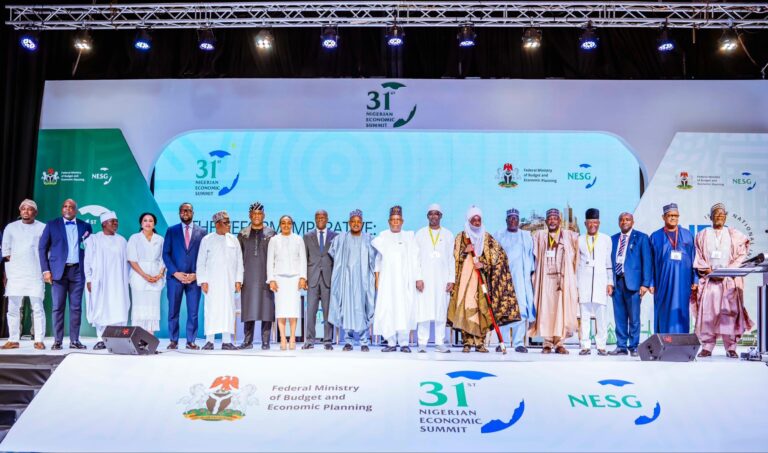President Bola Ahmed Tinubu has reaffirmed his administration’s commitment to driving Nigeria’s economic transformation through targeted financial support for local enterprises. The President said his government’s newly introduced ₦200 billion intervention fund for Micro, Small, and Medium Enterprises (MSMEs) and manufacturers was created to tackle deep-rooted structural constraints and boost competitiveness across industries.
Delivering his remarks at the opening of the 31st Nigerian Economic Summit in Abuja, Tinubu — represented by Vice President Kashim Shettima — stated that the ongoing reforms under his leadership are yielding tangible outcomes that have surpassed both domestic and global projections.
“Our policies are guided by a careful balance between sound economic reasoning and public expectation,” he noted, emphasising that the intervention fund aims to empower small businesses, promote innovation, and expand access to financing.
According to him, the initiative provides a financial pathway for entrepreneurs, particularly youth and vulnerable groups, to access loans, grants, and equity financing of up to $100,000. “We are a people-centred administration determined to restore hope to the unemployed, the poor, and the excluded,” Tinubu said.
He added that the intervention aligns with broader efforts to stimulate productivity, promote digital micro-lending, and expand financial inclusion at the grassroots level — vital steps in building an economy that works for all Nigerians.
Tinubu attributed Nigeria’s improving fiscal stability and foreign exchange resilience to deliberate policy decisions, including subsidy removal and fiscal reforms, saying these actions have “rescued public finances, strengthened investor confidence, and stabilised the economy.”
Highlighting measurable progress, the President disclosed that Nigeria’s economy expanded to ₦372.8 trillion in 2024, compared to ₦309.5 trillion in 2023, while government revenue rose from ₦19.9 trillion to ₦25.2 trillion in the same period. As of August 2025, collections had reached ₦27.8 trillion, surpassing the year’s revenue target.
Tinubu also revealed a significant turnaround in fiscal indicators, including the reduction of the nation’s debt service-to-revenue ratio from 97% to below 50%, an achievement that prompted international rating agencies like Fitch and Moody’s to upgrade Nigeria’s outlook to stable.
On non-oil performance, the President announced a 411% year-on-year growth in non-oil revenue as of August 2025, with the tax-to-GDP ratio now at 13.5%, up from around 7% a few years ago. He assured that the country’s debt-to-GDP ratio of 38.8% remains well within global safety thresholds.
Explaining his decision to boost allocations to state governments, Tinubu said it was crucial to empower subnational entities to pursue development strategies unique to their regions. “A true federation succeeds when every component has the resources and autonomy to drive its own growth,” he said.
The President commended economic experts and stakeholders for their continued partnership, stating that “progress is achieved when we converge on purpose, not when we diverge on comfort.”
Tinubu further noted that the recently enacted four Tax Reform Acts will improve domestic revenue mobilisation, reduce oil dependence, and simplify tax compliance while protecting low-income earners and encouraging innovation through digital taxation.
Declaring the summit open, the President expressed optimism that its deliberations would influence future policies geared toward sustainable and inclusive economic growth.
Speaking at the event, the Minister of Budget and Economic Planning, Senator Atiku Bagudu, lauded the collaboration between his ministry and the Nigerian Economic Summit Group (NESG), saying the partnership had strengthened the nation’s economic framework. He added that the reforms under the Renewed Hope Agenda are steadily improving productivity, easing the cost of living, and supporting inclusive growth.
Also addressing participants, NESG Chairman Olaniyi Yusuf urged the government to prioritise security as a cornerstone for economic progress, while Vice Chairman Boye Olusanya commended the government’s bold reforms but cautioned against policy reversals, warning that such moves could slow national growth.
The event was attended by several ministers, including Wale Edun (Finance and Economy), Jumoke Oduwole (Trade, Industry and Investment), Abubakar Kyari (Agriculture and Food Security), and Bosun Tijjani (Communications and Digital Economy).

